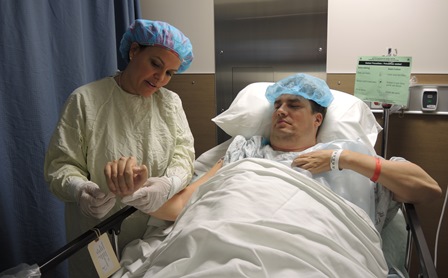A TOH surgical team rerouted nerves in Timothy Raglin’s arm to restore movement to his fingers.
Timothy Raglin may soon move his fingers for the first time in seven years after a team of surgeons at The Ottawa Hospital performed Canada’s first-ever nerve transfer surgery on a quadriplegic patient.
Raglin shattered part of his spinal column when he dove from the dock at his family cottage over seven years ago. He’s been a quadriplegic since the accident, but he has some movement in his upper arms and wrists, which made him a candidate for the surgery. He can’t control the nerves that move his fingers, but they’re still alive and the muscles are healthy, said Dr. Kirsty Boyd, who performed the surgery.
“That’s just sitting there, waiting,” she said. “If we can plug something into it, it’s good to go.”

Timothy Raglin and Dr. Kirsty Boyd demonstrated his current arm function before his nerve transfer surgery.
The procedure was pioneered by Canadian surgeon Dr. Susan Mackinnon, who flew at her own cost to Ottawa from St. Louis with colleague Dr. Ida Fox to guide the hospital’s team through Raglin’s surgery. Mackinnon herself has performed the surgery only a handful of times.
Dr. Boyd worked with TOH physiatrist Dr. Gerald Wolff to plan the surgery and select Raglin as an eligible candidate. They’re planning research on patient selection and outcomes of the procedure, in collaboration with Washington University in St. Louis.
During the surgery, the team connected the nerve that controls Raglin’s ability to pinch his right thumb and forefinger – disconnected from his brain since the accident – to a donor nerve from a muscle that bends the elbow. A similar procedure connected another donor nerve to one that should allow him to open his hand.
The nerves will die beyond where they were cut and sewn together, said Dr. Boyd, but the tubes that contained them will remain. The nerve should regrow down this pathway and branch out into the muscles. Nerves regrow at about an inch per month, so it could take a year to see the results.
Raglin said he doesn’t mind the wait – he’s thrilled that he was eligible for the surgery. For him, any improvement means more independence.
“My expectations are low. If it’s just a simple pinch to pick up grapes and feed myself grapes or chips, I’m happy,” he said. “At least I’ve got something.” he said.

Support patient care and research at
The Ottawa Hospital


 To reset, hold the Ctrl key, then press 0.
To reset, hold the Ctrl key, then press 0.